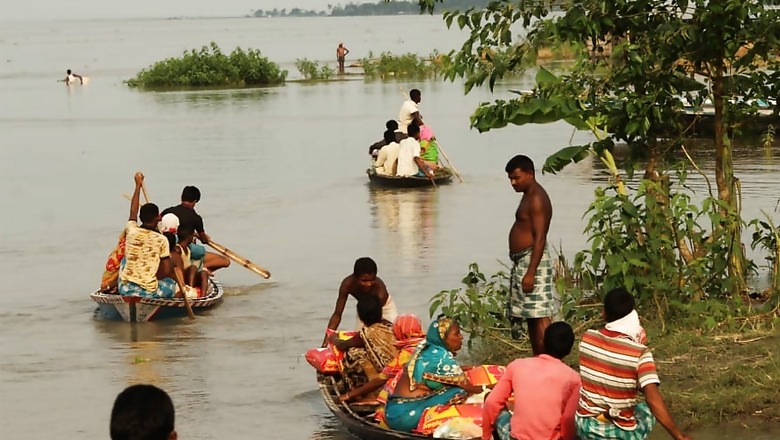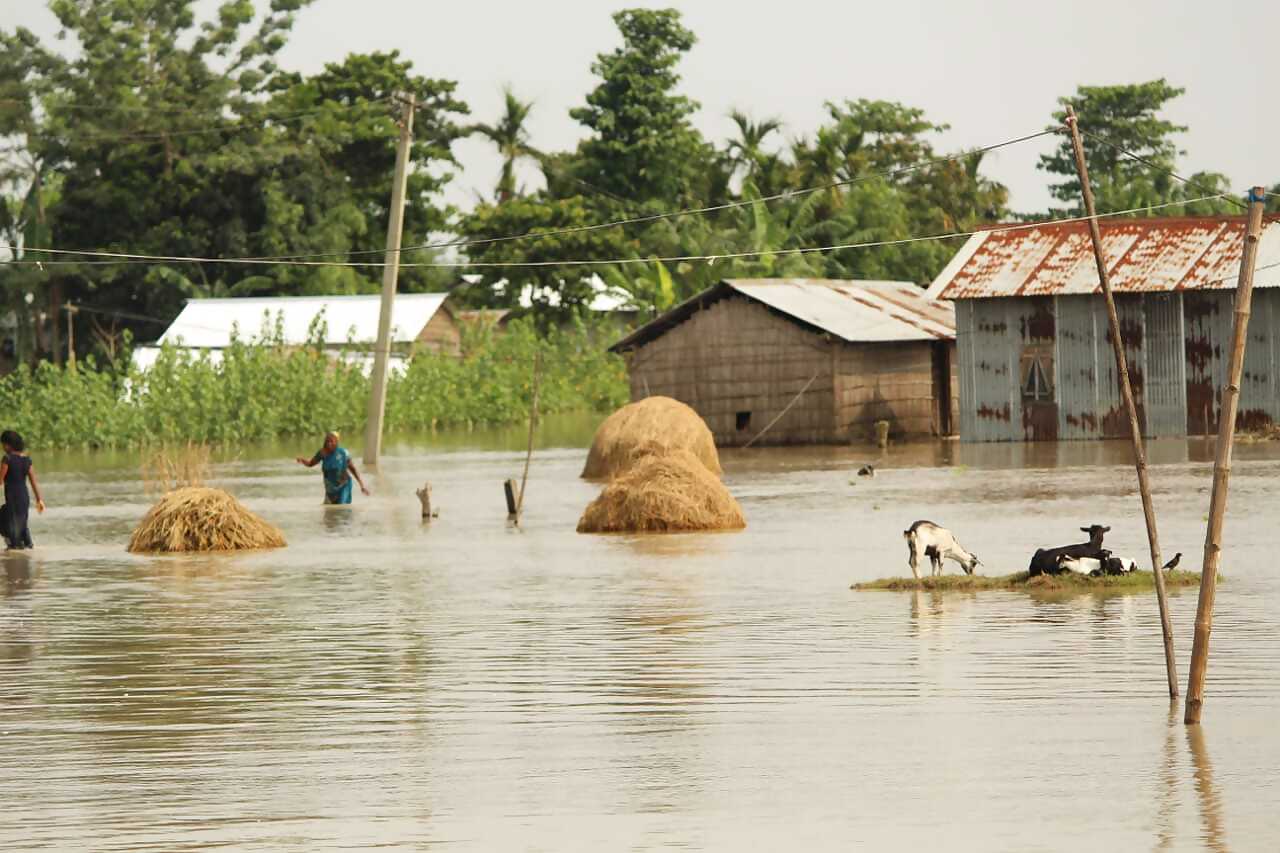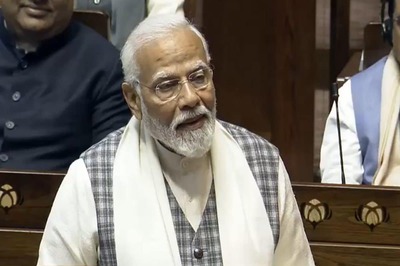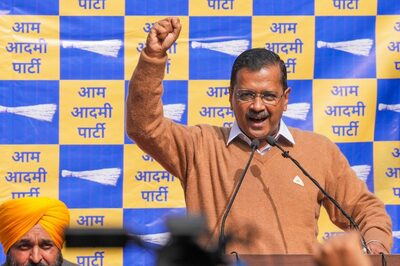
views
Nature has been merciless, its fury constantly pillaging their homes and land increasingly transforming them into climate-refugees in India’s northeastern state of Assam. But it is not just the vagaries of nature that has pushed many such penurious landless persons to the edge of survival, the coronavirus contagion induced lockdown is driving most families towards a situation of utter despair and a sense of insecurity.
The worst affected among them are people that resides on the chars (river islands or mid-channel bars) on the river Brahmaputra and especially those whose identity is constantly under a cloud of doubt, assumed to be of Bangladeshi origin and who failed the various citizenship tests that are in place. They are among the more than 1.3 million people who have been affected by the floodwaters with many having been uprooted from their homes, albeit the script that informs their plight is much different from the others.

Take the case of 47-year-old Gajibur of Pampara Char in Barpeta. His situation is one of utter indigence. He survives on mercy from people, having lost his land to the Brahmaputra, his belongings and his cattle and goats to pay his lawyers’ fees, cover costs of his travel, to attend NRC hearings which were organised within extremely short timeframe just before completion of the final list. “It’s all upon the almighty now to help people like me,” he says. He is one among over two million people in Assam who are staring at possible statelessness if they fail to meet produce documentary evidence of their claim to citizenship.
All seven members of Gajibur’s family have been left out of the final list and he was hoping to do the legwork for extra “kagaj” (papers) or documents to defend his case, but his sudden illness had come as a big blow for the family. Like Gajibur, residents of the chars in Barpeta are mostly Bengali-speaking Muslims and are assumed to be illegal migrants from bordering Bangladesh, even though most of them have been residents here for generations.
The current situation arising out of the coronavirus crisis and the raging floods has only made it worse, as these excluded families are made to live a hellish experience every day. Forhad Bhuyan, a local social worker who has led a series of volunteer relief work in various chars such as Tarabari, Koltoli, Jhatrabiya, Morichakandi and Lakhipur in Barpeta, paints a bleak picture of the lives of the residentsof these semi-aquatic habitats. “Firstly, the lockdown prevented them taking their agricultural produces — paddy, vegetables, sugarcane and jute — to the market and now the floods have washed away everything,” Bhuyan says, adding that many such families are already reeling under the pressure of the citizenship test that they are having to go through.
With access to most of these chars almost cut off, it has been impossible for government relief to reach the affected families. Scenes of people using country boats and rafts made out of banana trees to ferry themselves across to higher grounds for shelter is all that is visible across the vast expanse of the flooded Brahmaputra river.
“It isn’t easy to fathom the magnitude of their pain and anxieties, unless you experience it,” says Asraful Hussian, another social activist from Barpeta, as he explains the twin impact of the lockdown and the deluge on the financial conditions of the char inhabitants. Practically all the families with an average size of six persons in each are poor and dependent usually on one or two earning male members who work as daily wage labourers. For the past two years many among these families have been trying to organise their finances carefully, saving reasonable amounts to pay for their lawyers and other costs which were incurred during the proceduralism of NRC exercise.
Stories of embattled families selling off their land, cattle and belongings to bail themselves or a family member from being a “foreigner” or left out of the NRC, have been all over the media. Not much has changed since then for such groupings of citizens who are constantly under the radar of suspicion of being foreign to the land and culture and whose citizenship are decided by a Kafkaesque bureaucratic process. Their inability to pay the previous debts taken from friends and relatives and the probability for more financial requirements has made them more disillusioned and helpless.
Similar stories abound in many other flood prone environments in Assam. Take the case of the Kacharipety village under the Srijangram circle in the neighbouring Bongaingoan district. Here, families of doubtful citizens whose houses have been eroded by surging floodwaters are battling hard to save their homes. For 47-year-old Rajkumar Mondal, whose house on the banks of the river Aai is partially submerged by the rising floodwaters, the day begins and ends with a prayer of hope. More than 100 meters of his land have been eroded by the river since the past 10 years and he has had to shift his house 12 times from its original location. There are approximately about 150 poor and uneducated families in Kacharipety that are river erosion victims like Rajkumar and among them as many as 60 D-voters and many others whose names have not appeared in the final list of the NRC.
Incidentally, the house is all that Rajkumar has after selling off his cows, plantations and belongings to secure his release from the Goalpara detention camp where he was kept for four years on the suspicion of being a declared foreigner. He was released eight months back on bail and has to report to the nearest police station every week.
Till date, Rajkumar has failed to understand how he was declared a D-voter when he was born in the village of which his father was a resident too and had properties to his name. His 18-year=old daughter has also been made a doubtful citizen like him, barring his wife whose name has appeared in the final list of the NRC. He has spent over a couple of lakhs on his case and was hoping to better organise his case with competent legal advice, but with no job since the last eight months after his release on bail, he is literally impoverished. He earned anything between Rs500 to 600 as a daily wage working at building construction sites in nearby Kokrajhar but that was before his detention.
Local civil society organisations and volunteer groups in Bongaigaon have been active in providing support to people affected by the lockdown and the recent floods. These relief outreaches are in addition to the whatever relief has been provided by the local district administrations representing the government of Assam. “We have been providing all kinds of assistance to all the poor and also encouraging people to keep their documents safely,” says AhmedTobo from Bongaigaon a volunteer involved with relief work.
An assessment based on the work done by members of the Songbhidhan Sebok (believers of the Constitution) in Barpeta shows that more than 90 per cent families within many Chars such as Mohishkhuti, Lakhipur, Pampara, Kachumara NC, Atia, Tarabari and Dakshin Gudhuni have no money to buy food and medicines. All that they had saved has been spent during the past four months of lockdown. They are entirely dependent on the government’s relief packages and also on social organisations for food and medicines. While the below poverty and poor among the NRC left outs have been getting relief from the government, most D-voters and Declared Foreigners have had to depend on NGOs for food and medicines.
The Covid-19 lockdown and the deluge have come as “a double whammy for people already affected by citizenship verification processes,” says Asraful, who is also a leading member of Songbhidhan Sebok as well as the Parag Kumar Das Char library. In fact, these disruptions— a continuous source of income to manage their family, their medical needs, etc., — have made the likes of Asraful and other young volunteers representing the two organisations to step forward and help the affected people with donations collected from various individuals and groups. Their mission is simple: to ensure that scarcity of food and any other essential needs does not compel people, particularly the NRC excluded or the Declared Foreigners, to take any extreme step.
The Barpeta district has witnessed a spate of suicides in the recent past and good number of these has been related to the pressures created by the process of citizenship verification of people that are mostly poor and uneducated. “We certainly don’t want people to do anything like that anymore,” says Asraful, indicating that awareness drives over the past two years have made a huge difference. These little successes has led to a more concerted effort with as many as 1500 families receiving rations during the first phase of the Covid-19 lockdown.
A key feature of this outreach, in Barpeta and also in the neighbouring districts of Bongaigaon has been based on “a helping hand for all” approach without any form of discrimination. Young volunteers representing different organisations have been carrying out relief across to people and using these opportunities to engage with people and give them the listening ear concerning their plight, the financial impacts of the lockdown on their daily lives and their immediate needs.
The floods will subside and the coronavirus will after sometime become weaker and flatten out, but for the people of the chars in Barpeta or those displaced by river erosion in parts of Bongaigoan new challenges will arise with renewed anxieties over the process of proving one’s Indianness. These trials though not entirely new to the people here who are known for their grit, strength and survival skills under the most adverse of situation, yet to traverse through the maze of bureaucratic and legal processes is a completely different story. Only time will tell if they overcome the obstacles and get back their citizenship or would have to carry a new identity come the next flood.




















Comments
0 comment